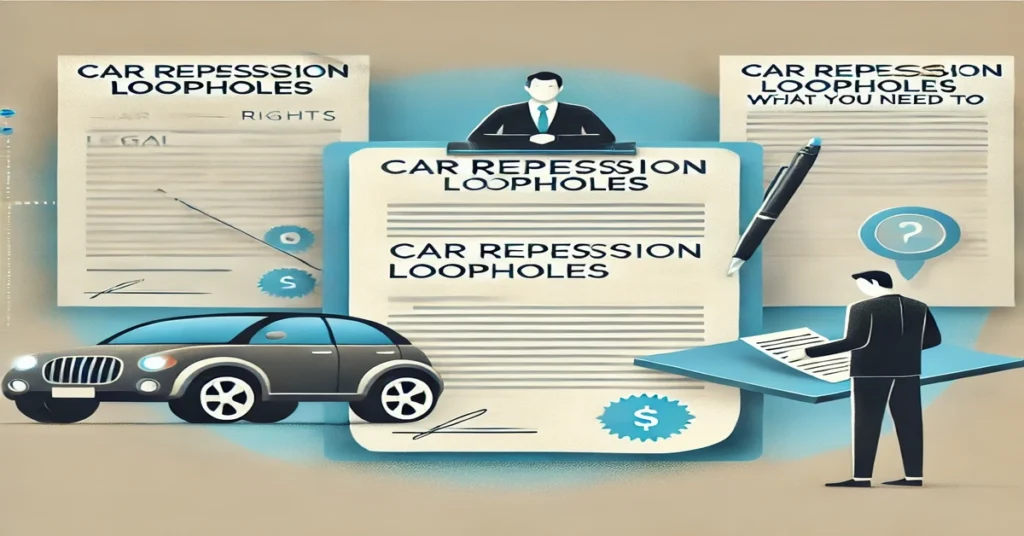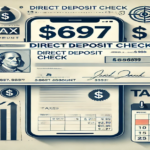Car repossession is a stressful event that can significantly impact your finances, credit score, and overall peace of mind. When you fall behind on auto loan payments, lenders have the legal right to repossess your vehicle. However, understanding the laws surrounding car repossession and identifying potential loopholes can help you navigate this difficult situation more effectively.
This article delves into the ins and outs of car repossession, explores potential loopholes that might be applicable in certain situations, and offers practical strategies to protect your rights. Additionally, we’ll provide six FAQs to address common concerns related to car repossession.
Table of Contents
- What Is Car Repossession?
- How Does Car Repossession Work?
- Legal Framework Surrounding Repossession
- Car Repossession Loopholes
- Lack of Proper Notice
- Breach of Peace
- Errors in Loan Documents
- Violating the Right to Redeem
- Failure to Sell the Vehicle Legally
- Statute of Limitations
- How to Prevent Car Repossession
- Steps to Take If Your Car Is Repossessed
- Common Myths About Car Repossession
- The Financial Impact of Repossession
- How to Rebuild After Repossession
- Conclusion
- FAQs
1. What Is Car Repossession?
Car repossession occurs when a lender or creditor takes back possession of a vehicle due to missed payments on an auto loan. Most car loans are secured by the vehicle itself, meaning that the lender holds a lien on the car until the loan is fully paid. If you default on your payments, the lender has the right to repossess and sell the vehicle to recover the outstanding loan balance.
2. How Does Car Repossession Work?
Car repossession typically follows these steps:
- Loan Default: If you miss one or more payments, your loan may go into default, depending on your lender’s terms.
- Notice to Borrower: Some states require lenders to notify you of the default and give you a chance to cure it before repossessing your vehicle.
- Repossession: The lender hires a repossession company to take the vehicle, often without prior warning.
- Auction or Sale: The vehicle is sold, and the proceeds are applied to your loan balance. If the sale doesn’t cover the full loan amount, you may still owe the remaining balance (known as a deficiency balance).
3. Legal Framework Surrounding Repossession
Repossession laws vary by state but generally include the following protections for borrowers:
- Breach of Peace Provisions: Lenders cannot use force, threats, or other illegal means to repossess a vehicle.
- Right to Redeem: Borrowers have the right to reclaim their vehicle by paying the overdue balance and associated fees.
- Notification Requirements: Some states require lenders to notify you before repossession or after the vehicle is taken.
- Deficiency Judgment Limitations: Certain states limit the ability of lenders to pursue deficiency judgments after repossession.
Understanding these legal protections can help you identify potential loopholes in the repossession process.
4. Car Repossession Loopholes
1. Lack of Proper Notice
In states where lenders are required to provide advance notice of repossession, failing to do so could invalidate the repossession. Borrowers can argue that they weren’t given a fair chance to resolve the default before losing their vehicle.
2. Breach of Peace
Repossession agents must follow strict rules when recovering vehicles. If they:
- Use physical force.
- Damage your property.
- Threaten or intimidate you.
- Enter a locked garage without permission.
You may have grounds to challenge the repossession based on a breach of peace.
3. Errors in Loan Documents
Mistakes in your loan agreement, such as incorrect payment terms, missing signatures, or unclear default provisions, can be used as a loophole to challenge the repossession.
4. Violating the Right to Redeem
If your lender doesn’t provide you with an opportunity to redeem your vehicle before it’s sold, they may be violating your rights. Ensure you receive proper notice outlining how to reclaim your car.
5. Failure to Sell the Vehicle Legally
When a repossessed vehicle is sold, lenders must follow state laws regarding:
- Selling the car at a commercially reasonable price.
- Providing proper notice of the sale to the borrower.
- Applying the sale proceeds correctly.
Failure to adhere to these requirements may give you a legal basis to dispute the repossession.
6. Statute of Limitations
If a lender waits too long to repossess your car or pursue a deficiency judgment, you may be able to invoke the statute of limitations, which varies by state.
5. How to Prevent Car Repossession
If you’re struggling to make your car payments, here are steps you can take to avoid repossession:
- Communicate with Your Lender: Reach out to discuss payment extensions, deferments, or restructuring options.
- Refinance Your Loan: Lowering your interest rate or extending your loan term can reduce monthly payments.
- Sell the Vehicle: Selling the car privately may allow you to pay off the loan and avoid repossession.
- Seek Financial Assistance: Explore local charities or organizations that provide emergency financial aid for auto loans.
- Budget Adjustments: Reallocate your expenses to prioritize car payments.
6. Steps to Take If Your Car Is Repossessed
If your vehicle has already been repossessed, follow these steps:
- Request Documentation: Ask your lender for written details about the repossession and the amount owed.
- Understand Your Redemption Rights: Learn how to reclaim your vehicle, including payment requirements and deadlines.
- Negotiate with the Lender: Attempt to settle the debt or negotiate a repayment plan.
- Monitor the Sale: Ensure the vehicle is sold legally and at a fair price.
- Consult an Attorney: Seek legal advice if you suspect any violations during the repossession process.
7. Common Myths About Car Repossession
Myth 1: Repossession Agents Need a Court Order
In most states, lenders can repossess a vehicle without going to court, as long as they follow state laws.
Myth 2: Hiding the Car Prevents Repossession
While hiding your vehicle may delay repossession, it could result in additional legal consequences if done improperly.
Myth 3: You’re No Longer Responsible After Repossession
If the sale of the vehicle doesn’t cover the full loan balance, you may still owe the deficiency balance.
Myth 4: Repossession Doesn’t Affect Your Credit
Repossession is reported to credit bureaus and can significantly lower your credit score.
8. The Financial Impact of Repossession
Car repossession can have long-term financial consequences, including:
- Lower Credit Score: A repossession remains on your credit report for up to seven years.
- Deficiency Balances: You may still owe money after the vehicle is sold.
- Difficulty Securing Loans: Future lenders may view you as a high-risk borrower.
- Increased Costs: Repossessed vehicles often incur towing, storage, and auction fees, which add to your debt.
9. How to Rebuild After Repossession
Recovering financially after repossession requires time and effort. Here’s how to start:
- Check Your Credit Report: Ensure the repossession is reported accurately and dispute any errors.
- Settle Outstanding Debts: Pay off any deficiency balances to prevent further damage to your credit.
- Build an Emergency Fund: Save money to cover unexpected expenses and avoid future defaults.
- Improve Your Credit: Focus on timely payments, reducing debt, and maintaining low credit card balances.
- Consider a Secured Loan: A secured loan or credit builder loan can help you rebuild your credit over time.
10. Conclusion
Car repossession is a challenging experience, but understanding your rights and exploring potential loopholes can help you regain control of the situation. By staying informed, communicating with your lender, and seeking legal advice when necessary, you can minimize the financial and emotional impact of repossession. Whether you’re working to prevent repossession or rebuild afterward, knowledge and proactive steps are key to navigating this difficult process.
FAQs
1. What are common car repossession loopholes?
Common loopholes include lack of proper notice, breach of peace during repossession, and violations of the right to redeem.
2. Can a lender repossess my car without notice?
In some states, lenders can repossess without notice, but others require advance warning. Check your state’s laws.
3. What is a deficiency balance?
A deficiency balance is the remaining loan amount after the repossessed vehicle is sold and the sale proceeds are applied.
4. How long does repossession stay on my credit report?
A repossession typically remains on your credit report for seven years from the date of the first missed payment.
5. Can I get my car back after repossession?
Yes, you may have the right to redeem your vehicle by paying the overdue amount and associated fees before it’s sold.
6. Should I consult an attorney for repossession issues?
Yes, an attorney can help you understand your rights, identify potential violations, and negotiate with your lender.







